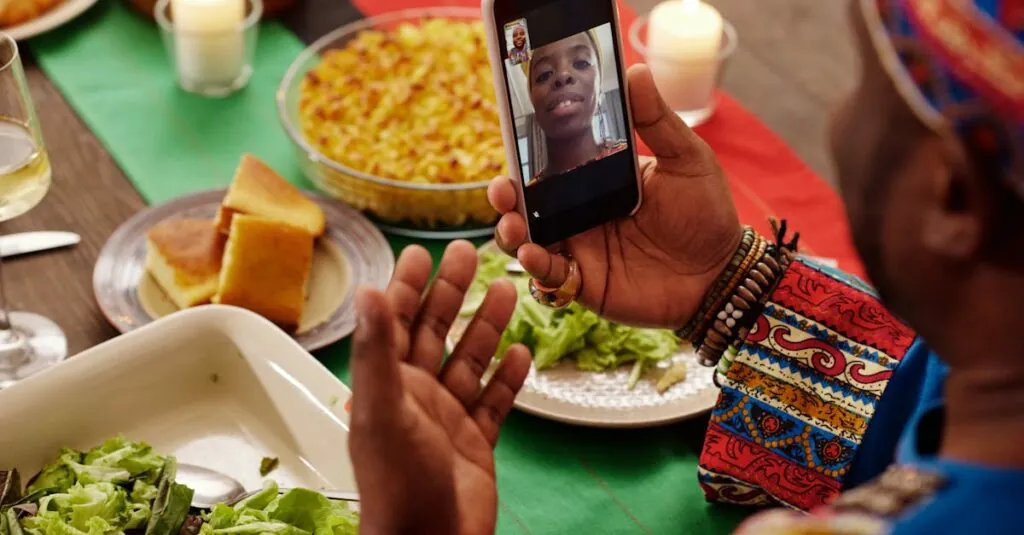In the vibrant heart of Central America lies Honduras, a treasure trove of family traditions that could make even the most stoic family member crack a smile. From lively gatherings filled with laughter to delicious feasts that could make your taste buds dance, these traditions are more than just rituals; they’re the glue that binds families together.
Imagine a Sunday afternoon where the aroma of homemade tamales wafts through the air, and everyone’s debating who makes the best salsa. It’s a delightful chaos that showcases the warmth of Honduran culture, where every moment is an opportunity to celebrate family ties. Dive into the rich tapestry of Honduran family traditions, where love, laughter, and a pinch of mischief create unforgettable memories.
Table of Contents
ToggleOverview of Honduras Family Traditions
Honduras family traditions encompass a rich tapestry of customs that enhance family unity. Gatherings often revolve around significant celebrations such as birthdays, holidays, and religious events, where family members gather to share food, stories, and laughter. Traditional dishes, including homemade tamales and various regional salsas, serve as focal points of these gatherings.
Emphasis on respect for elders forms a core principle in Honduran families. Younger generations often seek guidance and wisdom from older relatives, fostering a sense of appreciation for family history. Regular family meals create an atmosphere of togetherness, enabling open conversations and strengthening essential ties.
Celebrations such as the Day of the Dead and Christmas reflect the blending of Catholic practices with indigenous customs. Families engage in unique rituals and elaborate meal preparations to honor loved ones and celebrate faith. Such events not only reinforce cultural identity but also reinforce bonds within the family unit.
Music and dance play vital roles during family festivities, with traditional marimba tunes frequently setting the mood for celebration. Engaging in shared dance invites connections among family members, encouraging physical interaction and shared joy.
Honduran family traditions exhibit an unyielding commitment to community and connection. From the warmth of gatherings to the observance of customs, these practices become invaluable in nurturing familial relationships and creating lasting memories.
Key Elements of Family Life
Family life in Honduras thrives on interconnectedness and respect, embracing unique structures and shared responsibilities. These dynamics cultivate deep-rooted relationships that reflect the culture’s values.
Family Structure
Honduran families often function as extended units where multiple generations live together. This structure encourages strong inter-family bonds, promoting collaboration among relatives. Parents, grandparents, aunts, and uncles play significant roles in raising children. In many cases, siblings support each other in daily routines, enhancing a sense of belonging. Cultural emphasis on togetherness creates a nurturing environment for children. Families commonly engage in communal activities, fostering unity across generations. Each member contributes to family affairs, ensuring that everyone feels valued.
Roles and Responsibilities
Roles within Honduran families are generally well-defined, with each member contributing uniquely. Traditionally, fathers serve as primary providers, often taking on work outside the home. Mothers typically manage household tasks and caregiving, ensuring a stable environment. Children partake in chores, learning essential skills while developing a sense of responsibility. Elders command respect, with younger members often seeking their guidance on important matters. This generational wisdom enhances family decision-making. Celebrations involve collective preparation, illustrating teamwork and shared responsibilities that strengthen familial bonds.
Celebrations and Rituals
Honduran celebrations and rituals play a pivotal role in fostering family unity and cultural identity. These events bring families together, allowing them to share traditions that span generations.
Major Holidays
Major holidays in Honduras, such as Christmas and the Day of the Dead, hold significant meaning for families. Christmas festivities include the traditional “Nochebuena,” where families gather for a late-night feast featuring festive dishes. On the Day of the Dead, families honor deceased loved ones by preparing altars adorned with flowers, food, and photos. Both occasions emphasize the importance of sharing meals and creating lasting memories, reinforcing familial bonds and cultural heritage.
Birth and Coming of Age Ceremonies
Birth and coming of age ceremonies mark vital milestones in Honduran families. A child’s baptism often features a family gathering to celebrate their entrance into the faith. Quinceañeras, celebrated when girls turn fifteen, highlight the transition from childhood to womanhood, showcasing traditional dresses and dances. These ceremonies not only celebrate individual milestones but also unite families in shared joy and cultural pride, ensuring that cherished customs endure through generations.
Culinary Traditions
Honduran culinary traditions reflect the country’s rich heritage and deep-rooted family values. Family gatherings often center around delicious, homemade dishes that bring everyone together.
Traditional Dishes
Tamales, a staple in Honduran cuisine, consist of masa filled with meats, vegetables, or cheese, wrapped in corn husks. Often accompanied by salsa, these meals showcase diverse flavors and ingredients. Another favorite, baleadas, feature flour tortillas filled with beans, cheese, and avocado, served as a popular breakfast item. Sopa de caracol, or conch soup, highlights the coastal influence and is typically rich in flavor. Horchata, a traditional drink made from rice, provides a sweet finish to meals, further enhancing the dining experience.
Role of Food in Family Gatherings
Food acts as a vital connector during family gatherings, amplifying both conversations and relationships. Main meals bring families together, facilitating storytelling and laughter in a welcoming atmosphere. Celebrations, especially holidays, see families preparing favorite dishes, illustrating unity and shared heritage. Parents teach children recipes, passing down cultural knowledge across generations. Shared experiences around meals create lasting memories, reinforcing bonds among family members. Overall, the act of eating together highlights the importance of connection and togetherness in Honduran families.
Influence of Culture on Family Traditions
Cultural factors significantly shape family traditions in Honduras. These influences create a rich tapestry that enhances familial bonds and interactions.
Native Influences
Indigenous customs heavily influence Honduran family traditions. Celebrations often incorporate native rituals, reflecting the deep-rooted heritage of the country’s original inhabitants. Festivals bring together families, showcasing traditional music such as marimba, which infuses gathering spaces with vibrant sounds. Food also plays a crucial role, with native dishes served during significant events. Altars with offerings on the Day of the Dead highlight how ancestral respect remains pivotal. Community participation in these rituals underscores the importance of unity among families, reinforcing cultural pride.
Spanish Heritage
Spanish colonization brought additional layers to family customs in Honduras. Catholicism, as integrated into everyday life, shapes how families celebrate significant religious events. Festivities like Christmas feature traditions such as the “Nochebuena” feast, which combines Spanish culinary influences with local flavors. These gatherings often include processions and prayers, reflecting spiritual devotion. Shared meals during these celebrations reinforce social connections within families. Respect for elders emerges through traditions passed down from generation to generation. Overall, this blend of heritage enriches family life and fosters a deeper appreciation for cultural identity.
Honduras family traditions embody the essence of unity and connection. Through shared meals and vibrant celebrations, families create cherished memories that resonate across generations. The respect for elders and the roles within the family structure foster a sense of belonging and responsibility.
As they embrace their rich cultural heritage, Honduran families continue to honor their roots while adapting to modern influences. These traditions not only celebrate life’s milestones but also reinforce the bonds that hold families together. In every gathering, the spirit of community thrives, showcasing the warmth and joy that define Honduran culture.



